From automated thermal screening-cum-sanitiser dispenser to lift calling system driven by a foot pedal, Delhi Metro has taken a slew of measures to ensure least physical contact for riders when it resumes services next week.
After being closed for over five months due to the COVID-19 pandemic, metro services will be resumed in three stages from September 7-12, but stations located in containment zones will remain closed.
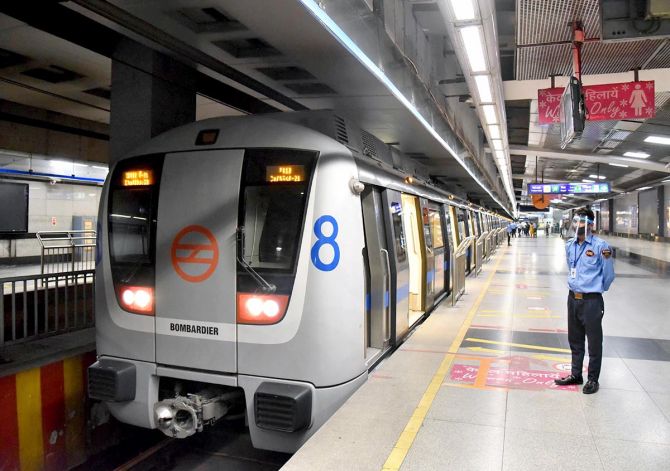
A preview was held for mediapersons at Rajiv Chowk Metro Station, from the point of entering station premises to boarding a coach, on Thursday. Photograph: ANI Photo
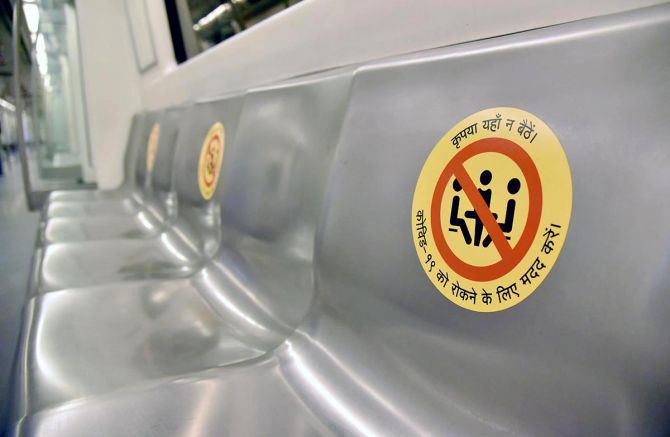
Dos and don'ts on COVID-19 have been prominently displayed at metro stations, and a large team of staff will be deployed to regulate or restrict entry of passengers in case of crowd build up or violation of social distancing norms, the Delhi Metro Rail Corporation said. Photograph: ANI Photo
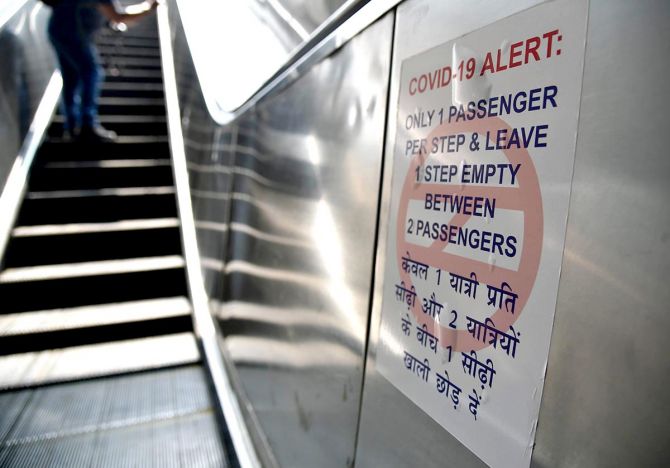
Use of Aarogya Setu App by commuters will be advisable, and regular announcements on maintaining hygiene and social distancing norms will be continuously announced in station premises and inside coaches. Photograph: ANI Photo
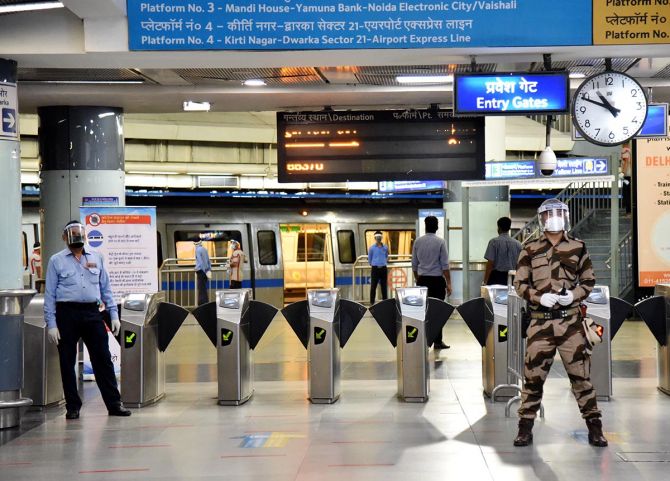
Only smart card users, including QR code users on Airport Express Line, will be allowed to travel, which can be recharged digitally without any human interface. Recharge of smart cards at ticket vending machines (TVMs) or Customer Care Centre will be through cashless mode only, via debit card, credit card, Bharat QR code etc. Photograph: ANI Photo
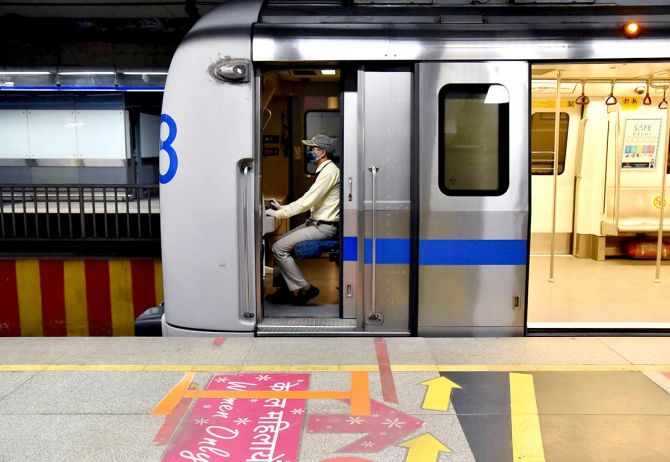
A Delhi police official said wearing of masks inside the premises and inside trains is mandatory and 'challans will be issued if they violate this' rule. Photograph: ANI Photo
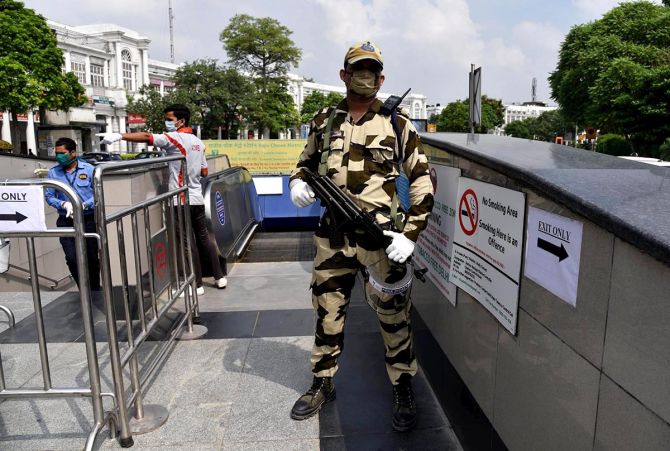
The total number of entry points at Delhi Metro stations will be heavily curtailed to ensure compliance with COVID-19 safety norms. Photograph: ANI Photo
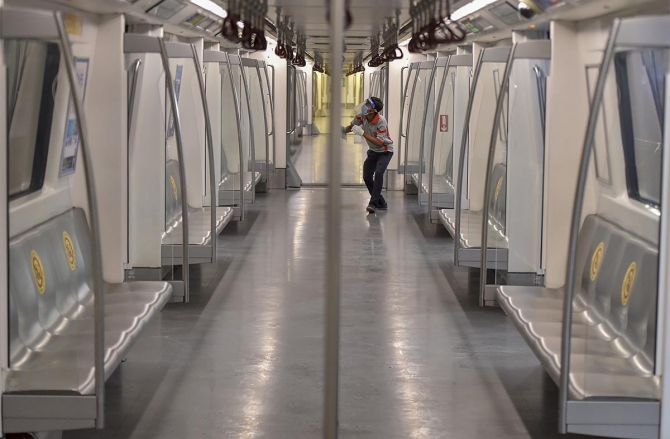
Trains will operate in batches of four-hour each from 7-11 am in the morning and 4-8 pm in the evening. Photograph: Ravi Choudhary/PTI Photo
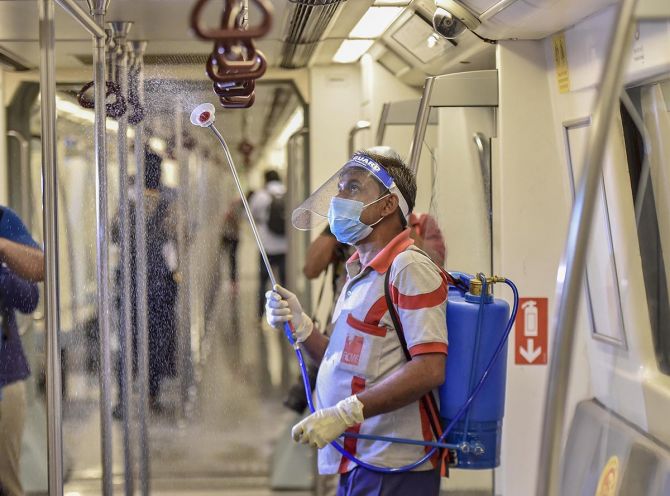
The stoppage duration of trains will be longer. From 10-15 seconds at each station it will be increased to 20-25 seconds, and at interchange facilities, it will be increased from 35-40 seconds to 55-60 seconds, when services resume. Photograph: Ravi Choudhary/PTI Photo
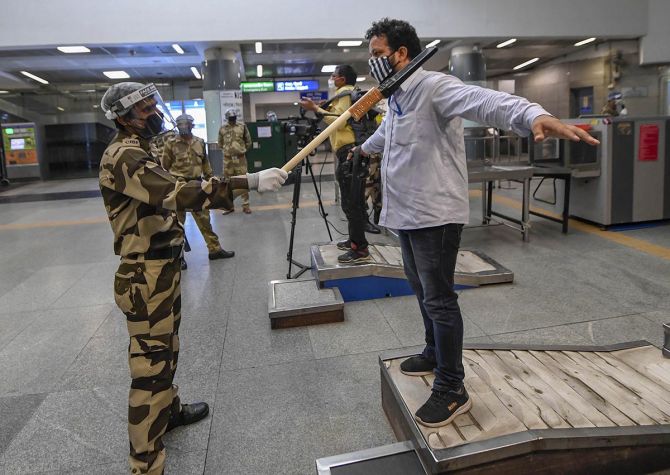
At all stations, Central Industrial Security Force staff will be doing 'contactless frisking' and red lines have been drawn at a gap of one feet to ensure social distancing while queueing up. Photograph: Ravi Choudhary/PTI Photo
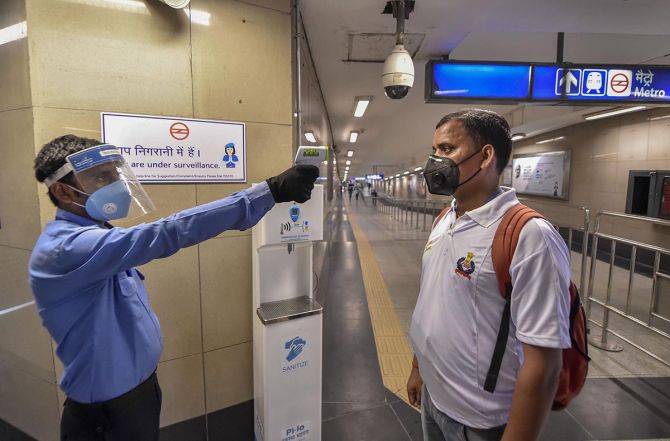
Officials of the urban transporter also cautioned that 'trains may not stop at some of the stations' if social distancing norms are not adhered to by passengers. Photograph: Ravi Choudhary/PTI Photo
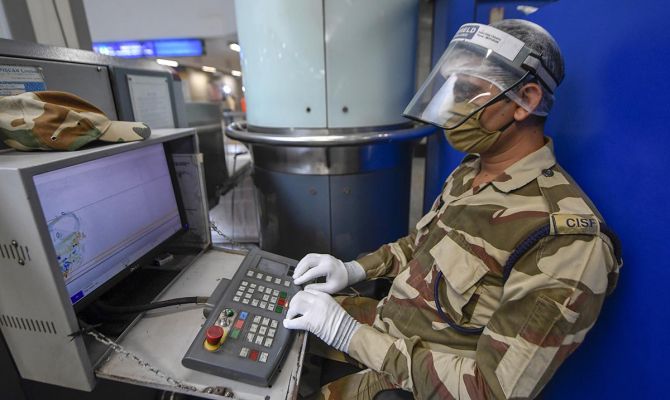
Luggage bags will be sanitised just before the frisking points, and people are advised to carry light luggage with no metallic objects. Photograph: Ravi Choudhary/PTI Photo
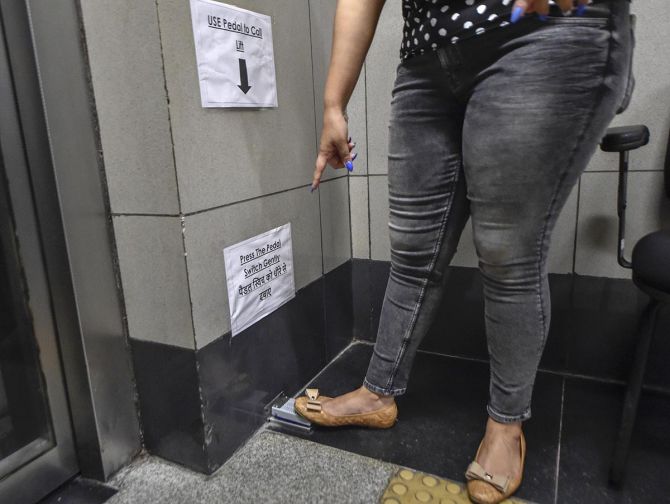
At 16 metro stations, including Kashmere Gate, Rajiv Chowk, IGI Airport, Hauz Khas, and Mandi House, push-button facilities to call a lift have been disabled, and commuters can press a foot pedal to call it. Beyond that the lift will operate automatically, from vertical movement to opening and closing of doors. There are 50 such lifts at these metro stations. Also as per the COVID-19 safety norms, a maximum of three passengers will be allowed in a lift at a time at any station. Photograph: Ravi Choudhary/PTI Photo
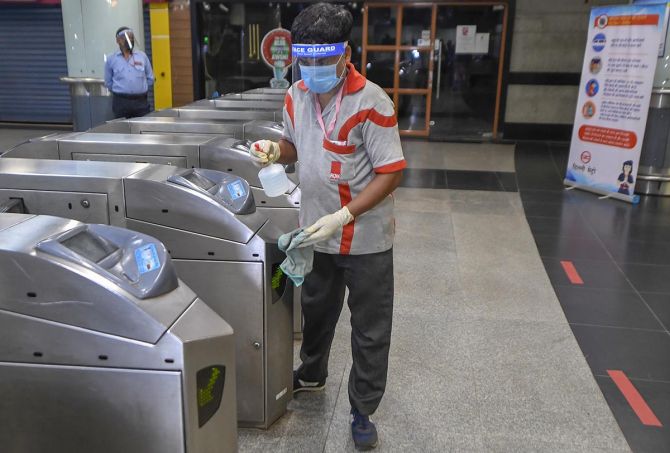
No tokens will be issued to passengers due to the high risk of virus spreading through it. Photograph: Ravi Choudhary/PTI Photo
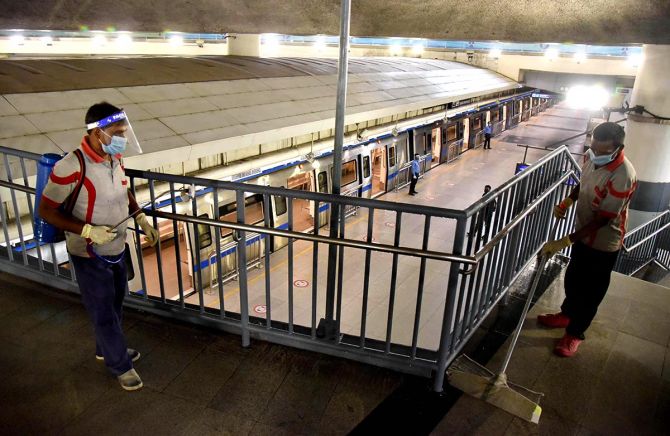
New smart cards can be purchased through cashless modes. Grievance redressal will be taken up through online means and social media, and complaint books at stations will be discontinued for the time being. Photograph: ANI Photo
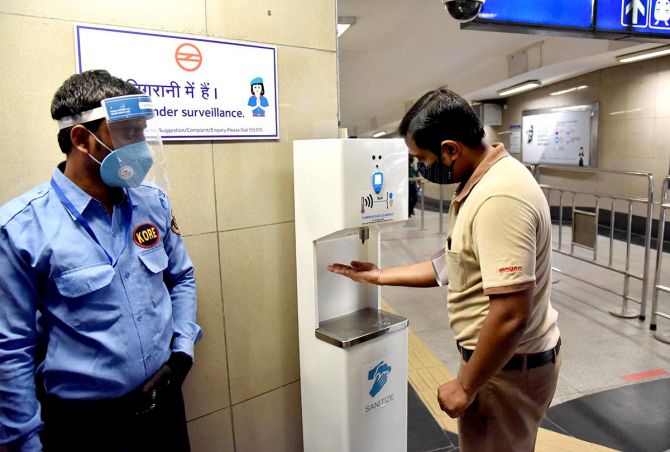
At the point of entry at 45 stations, automated thermal screening-cum-sanitiser dispensers have been installed, which can read a commuter's body temperature once a person puts their forehead in front of it, and sanitiser will drop from a dispenser below, once hands are kept below the nozzle. This facility will be available at 17 metro stations, including Rajiv Chowk, Patel Chowk, Central Secretariat and Vishwavidyalaya stations, of the Yellow Line which will be the first to resume services on September 7. Photograph: ANI Photo
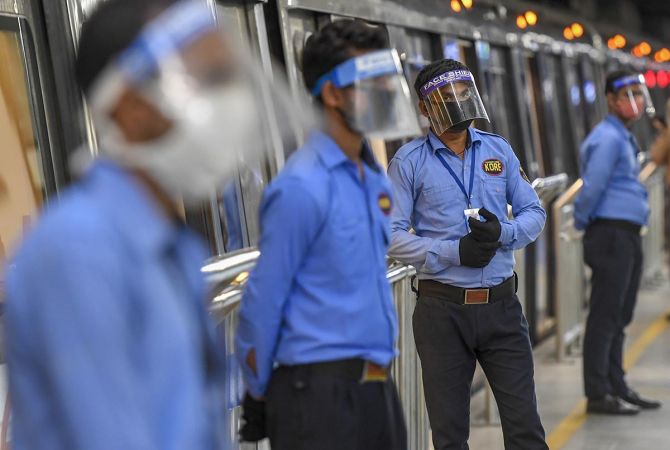
Metro services in Delhi-NCR have been closed since March 22 due to the pandemic. Photograph: Ravi Choudhary/PTI Photo
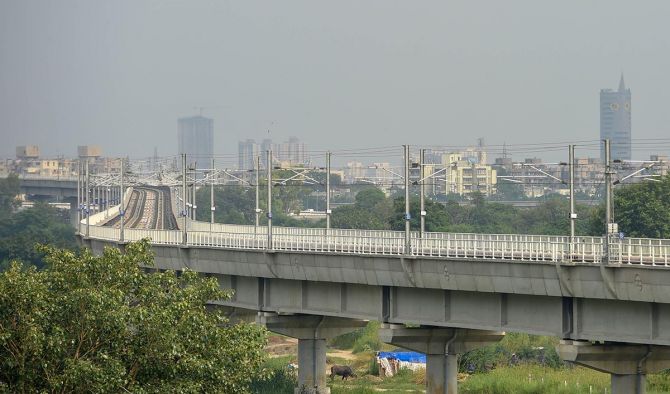
DMRC has 10 lines spanning 242 stations, and 264 stations including the Rapid Metro in Gurgaon. Photograph: Vijay Verma/PTI Photo











 © 2025
© 2025